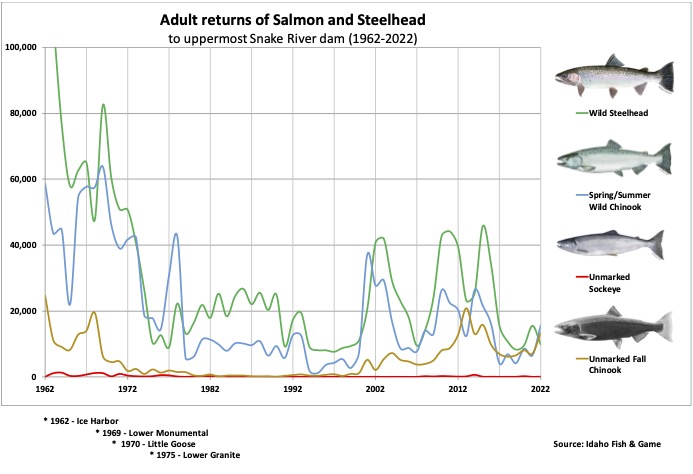forum
library
tutorial
contact

Pro-breachers Speak Out
at Dam Meeting
by Eric Barker
Lewiston Tribune, May 26, 2023
|
the film forum library tutorial contact |

|
Pro-breachers Speak Out
by Eric Barker
|
In listening session, roughly 37 favor breaching and 18 oppose it
 People in favor of breaching the four lower Snake River dams to recover salmon and steelhead outnumbered but did not overwhelm those who want the dams to stay in place during a U.S. government listening session Thursday.
People in favor of breaching the four lower Snake River dams to recover salmon and steelhead outnumbered but did not overwhelm those who want the dams to stay in place during a U.S. government listening session Thursday.
That is in contrast to earlier sessions when breaching advocates dominated the public comments. The online sessions are being hosted by the Federal Mediation and Conciliation Service and tied to settlement talks over a long-running lawsuit centered on threatened and endangered Snake River salmon and federal dams in the Columbia River basin. The plaintiffs to the lawsuit and the Biden administration agreed in 2021 to enter mediation and seek a durable long-term strategy to recover threatened and endangered runs of salmon and steelhead. Breaching the dams is one of the items being discussed in the talks that are scheduled to conclude in August.
While the listening sessions are billed as a way for members of the public to weigh in on salmon recovery options within the Columbia River basin, they have been treated by commenters as a referendum on Snake River dam breaching. On Thursday, roughly 55 people were able to comment during the three-hour session. They included representatives of public utility districts, conservation groups, faith leaders, farmers, high school students, port commissioners and others. Of those, 37 expressed support for breaching the dams and 18 said they should be kept in place.
Many of those who want the hydroelectric dams to be retained said the structures are vital to meeting the clean energy goals of Northwest states and without them the regional electric grid would become unreliable. They said farmers, who rely on the dams to barge their crops to downriver ports, would suffer without slackwater. Lastly, they said declines in Endangered Species Act-protected salmon and steelhead are more appropriately blamed on ocean conditions, climate change, predators and overfishing than the dams.
Sarah Highfield, communications director of the Port of Whitman County, said the Biden administration appears to have already decided the dams need to be breached. In a lead-up to the session, federal officials asked the public to tell them what steps should be taken to restore the lower Snake.
"We reject this conclusion on the basis that it is neither warranted to recover ESA-listed salmon species nor compatible with the many authorized purposes of the Columbia-Snake River system for hydropower, navigation, flood control, irrigation and recreation," she said. "Rather, the federal government's legal objective should not be some form of lower Snake River ‘restoration,' which is commonly akin to dam breaching in these discussions, but rather the recovery of ESA-listed salmon species to the point they can be delisted."
Several representatives of public utility districts that get most or all of the power from the dams said breaching them would be a mistake.
"Today, I again sound the alarm with regard to grid reliability. I can't emphasize enough -- this is not hyperbole," said Kristin Masteller, general manager of the Mason County PUD at Potlatch, Washington. "We face the biggest threat to regional grid reliability today than we have in two decades, and that's with these four lower Snake River dams in operation."
Instead of investing billions to breach the dams and mitigate the lost services, Masteller said that money should be spent to strengthen the region's grid and power generating systems.
"We will not meet the 2045 carbon-free energy requirements in Washington State's Clean Energy Transformation Act, nor President Biden's ambitious carbon reduction goals, without our federal hydropower system and the lower Snake River dams," she said.
Breaching advocates countered that there are other ways to generate electricity and other ways for farmers to get their goods to overseas markets. There is no replacement for the fish that they said are critical to the region's culture, economy and its diverse interconnected ecosystems.
"Bypassing the lower Snake River dams would not be easy and it would be an expensive project, but it could transform the region," said Kyle Maki of the Idaho Wildlife Federation. "Not only is it an essential step toward recovering our salmon and steelhead populations, but the necessary investments into our infrastructure, replacement energy, and crop transportation would create many jobs, fueling more growth throughout the region."
Some commenters urged the government to honor its treaties with Columbia River tribes such as the Nez Perce. Rabbi Seth Goldstein of Olympia is a member of an interfaith community known as the Earth Ministry. He said in addition to being an environmental and economic issue, Snake River salmon recovery is a spiritual issue.
"We have the ability to restore for ourselves and future generations a continuous bounty of salmon by breaching the lower Snake River dams," he said. "Faith communities of the Northwest call upon the Biden administration to act to do something meaningful before the end of the stay on litigation, and to listen to the tribes, honor their leadership, and fulfill our treaty obligations."
Those who were unable to win a coveted spot to comment during the session can submit written comments at bit.ly/43abjtS.
learn more on topics covered in the film
see the video
read the script
learn the songs
discussion forum
